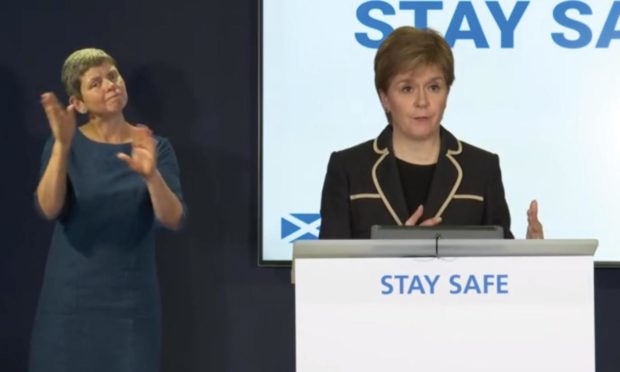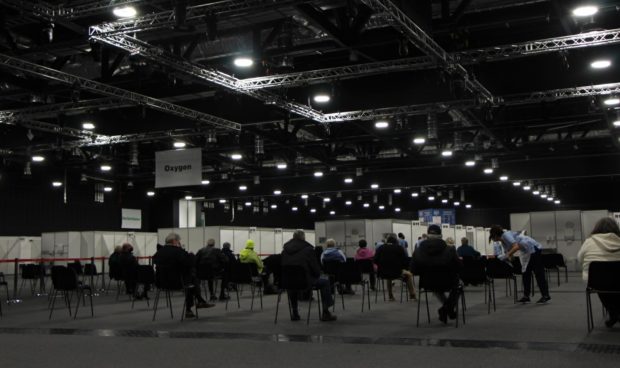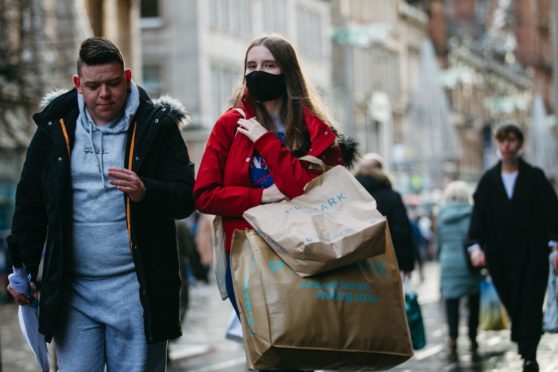First Minister Nicola Sturgeon has said it is “brilliant” that nearly a quarter of 18-29s registered for their Covid vaccine at the first opportunity.
A booking system was launched for the age group earlier this week, and within the first 16 hours, 22% of people had registered for their first jab.
Anyone between the ages of 18 and 29 can register, while the 30-35 age band are being urged to look out for their blue envelopes.
Across the country, 16,421 people received their first dose of the vaccine on Monday, while 29,035 Scots were given their second dose.
With the total number of doses of vaccine being given now topping five million, Ms Sturgeon said this was a “fantastic milestone” and also a “massive logistical achievement for all of our vaccination teams across the country”.
However, she confirmed Scotland is experiencing a rise in cases, noting that over the last 16 days “case numbers albeit from a very low level have actually doubled”.
Ms Sturgeon said while some of this rise would be due to higher testing levels, the percentage of tests that were coming back positive had been “creeping up”.
She added: “Some of the increase in case numbers being recorded just now will be due to the easing of restrictions over the past month.”
But she said “another important factor” was the latest variant of Covid-19, April 0.2 (formerly known as the Indian variant).
Vaccine roll-out could break the link
The first minister explained that the success of the vaccine rollout could be breaking the link between positive cases and deaths.
Registration can be done by calling the national COVID-19 Vaccination Helpline on 0800 030 8013 or on the NHS inform website form.
This could mean that rising case numbers will not always mean stricter restrictions moving forward.
“Increasingly we are monitoring whether and to what extent vaccination might be breaking that link between rising case numbers and significantly rising cases of serious illness and death,” she said.
“And if that does prove to be the case, as we hope it will, we hope our response to this virus can evolve as well.”
She said this “might mean we don’t have to react quite so aggressively with tough restrictions in the face of rising case numbers”.
She added this would be a “key factor” in decisions going forward, both in relation to Glasgow and the country as a whole.
Plans for the first 100 days coronavirus recovery plans will be announced in the Scottish Parliament tomorrow.
Yesterday, it emerged that around half the coronavirus vaccine appointments The SSE Hydro in Glasgow were missed.
Ms Sturgeon stressed there were many reasons why vaccination appointments are being missed, including letters being sent to old addresses and people being unable to attend due to work commitments.
She said uptake rates are still very high, but said everyone had a part to play in making the vaccine programme a success.
Updated advice also now means that the time between jabs has been reduced from 12 weeks to eight weeks – meaning all adults are expected to have been offered their vaccinations before the predicted date of the end of July, depending on supply.
Chief medical officer Gregor Smith, however, there was no clear data to show when those under 17 might be offered a vaccine.
‘Cautious optimism’ Glasgow is stabilising
Ms Sturgeon said there are signs for “cautious optimism” about the Covid-19 outbreak in Glasgow, which remains at a higher restriction level than anywhere else in Scotland.
Glasgow City Council is the only local authority area in to remain in Level 3 of restrictions – prohibiting different households mixing at home and meaning hospitality venues cannot sell alcohol indoors.
Travel in and out the area is prohibited.
Ms Sturgeon said: “In Glasgow, the seven-day average of new cases has increased since Friday: from 112 new cases per 100,000, to 137.
“However, it’s important to recognise that the extensive public health efforts that are underway in Glasgow will take time to work through, given the scale and complexity of the city so it’s important that we don’t lose heart.
“In fact, just in the last two days or so, we may have started to see some signs that case numbers are stabilising.”
East Renfrewshire was also raised as a potential cause for concern at last week’s briefing. The first minister said cases may have fallen slightly, but that it is still important to remain cautious.
An update on changes will be given on Friday.


